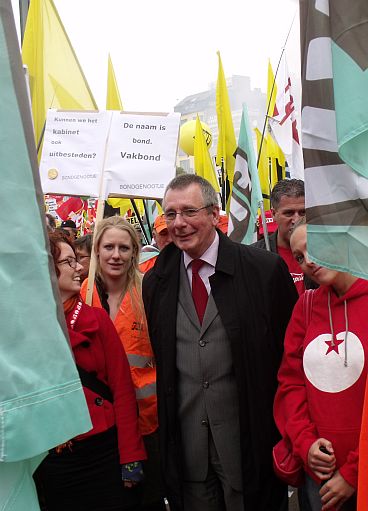De Jong: Council of Europe condemns limits on trade union rights by means of internal market rules
De Jong: Council of Europe condemns limits on trade union rights by means of internal market rules
On 20th November the Council of Europe, in its long-awaited judgment on the controversial ‘Laval’ court case, confirmed in plain language that the European Court of Justice (ECJ) had breached the European Social Charter by making trade union rights subordinate to the free market. The council of Europe represents forty-seven countries in Europe. Responding to the ruling, SP Euro-MP Dennis de Jong said: ‘I have this morning asked the European Commission what consequences are attendant upon this verdict. In particular it shows how important it is that the Europe Union should immediately become party to the European Social Charter. Otherwise we will find ourselves in the bizarre situation that member states are being judged by the Council of Europe that member states will be condemned whenever they apply policy for which the Commission of the ECJ is responsible.’
 The Laval case and other ECJ jurisprudence limits trade union rights, making it impossible for workers employed by corporations established in other member states to take strike action, while collective labour agreements will be recognised only if they are negotiated at national level, which have long failed to include guarantees of equal pay for equal work for both indigenous and foreign workers. ‘The judgment is therefore extremely important,’ says De Jong. ‘The Council of Europe states in plain terms and in numerous explanatory considerations adopted unanimously that the EU has breached fundamental human rights, amongst which are trade union rights. The Council of Europe cannot enforce this ruling, but the EU now looks foolish and can be called to account by non-member states in Europe.’
The Laval case and other ECJ jurisprudence limits trade union rights, making it impossible for workers employed by corporations established in other member states to take strike action, while collective labour agreements will be recognised only if they are negotiated at national level, which have long failed to include guarantees of equal pay for equal work for both indigenous and foreign workers. ‘The judgment is therefore extremely important,’ says De Jong. ‘The Council of Europe states in plain terms and in numerous explanatory considerations adopted unanimously that the EU has breached fundamental human rights, amongst which are trade union rights. The Council of Europe cannot enforce this ruling, but the EU now looks foolish and can be called to account by non-member states in Europe.’
The European Commission recently put forward a proposal which would have confirmed precisely the opposite and made social rights subordinate to the free movement of services or the freedom of establishment of companies within the framework of the internal market. The Commission was forced to withdraw this proposal when enough national parliaments, under a new procedure introduced in the Lisbon Treaty known as ‘showing the yellow card’, had rejected it. The trade union movement and the SP have for years urged the addition of a protocol to the Lisbon Treaty containing a social progress clause making it clear that social rights, such as the right to strike or the right to collective bargaining, always take precedence over the internal market. Now, this ruling from the Council of Europe’s Supervisory Committee for the European Social Charter, backs the unions.
